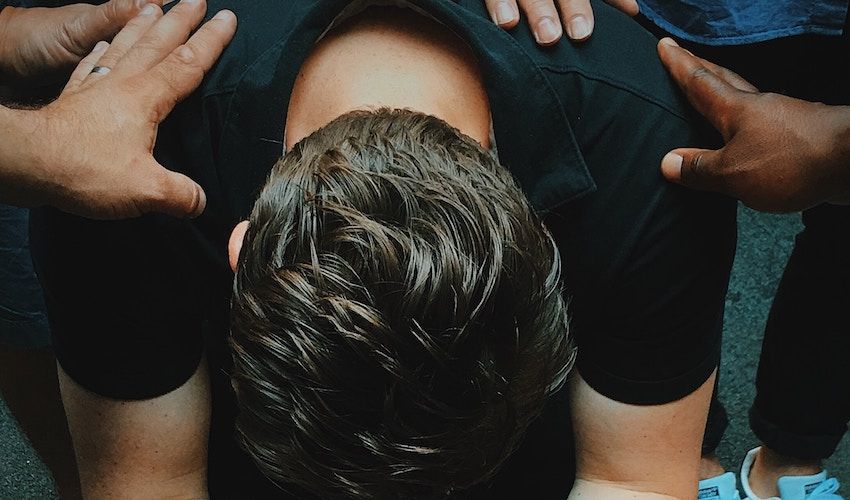

A volunteer with a bereavement group, who lost a family member to suicide, has urged islanders to be mindful of their language when discussing it to avoid making the grieving process more difficult.
The comments came from Nathalie, a volunteer with a peer group that sees islanders with "lived experiences" of suicide support others going through the same grieving process in bi-monthly meetings held at Mind Jersey.
Each year in Jersey, approximately 13 individuals take their own life. It is estimated that each suicide can have a lasting, devastating effect on up to 150 people within their families, friends and communities.
Pictured: The bi-monthly meetings take place at Mind Jersey's office on Beresford Street.
Due to the stigma that still surrounds suicide, some find it hard to talk about what happened. 'Survivors' also often feel that no one understands what they are going through.
Nathalie told Express that some of the connotations attached to suicide put people “in the wrong frame of mind.” “’Commit suicide’ makes it sound like it’s criminal. It’s difficult enough to lose someone without referring to your loved one as a criminal.”
“Grief is grief, a loss is a loss,” she added. “But suicide is very difficult, there’s no rationale. You can’t think straight, you are in limbo. The triggers are different, there’s a whole string of emotions.”
Nathalie says she couldn’t tell anybody when she lost a family member to suicide, due to the stigma that still persists. She also struggled to talk to her partner as she felt no one understood what she was going through. “I was worried about what people would think. I did not know how to say it to other people, you don’t want to make the person comfortable.

Pictured: "Nothing anybody said made sense. I was utterly lost, I didn’t not know what to do," Nathalie said.
“A suicide is different, there’s so much negative connotations. It’s difficult to talk about. We are talking about a lot more but that does not help the person in that moment.”
Nathalie says all she needed at time was the emotional support of someone who had been there and could understand she didn’t want to tell anyone. “I was in such shock, disbelief, despair and denial. There’s a part of you that thinks that maybe they made a mistake.
“Nothing anybody said made sense. I was utterly lost, I didn’t not know what to do. It was like a pressure cooker, everything was inside. In moments like this, you don’t want to tell anyone because you do not want to be the burden.”
Following the loss of a loved one, Nathalie struggled to deal with the practical side of things, including bank accounts.

Pictured: All four peer supporters can help with the practical side of things - something Nathalie said can be difficult.
It was for that reason she decided to volunteer to help others, whether they have been recently bereaved by suicide or several years into their grieving process. “I wanted to give something back, so that people do not feel they have nowhere to go,” she explained.
“We all have a deep desire to help. Nobody understands unless you have been in those shoes. By speaking to others who have gone through this, you realise this might not have been a unique feeling.”
The 'Bereaved by Suicide' support group meets every second Tuesday of the month at Mind Jersey's offices on Beresford Street. It is open to anyone, and Nathalie, like the other volunteers, is available to speak to survivors on a one-to-one basis.
“Sometimes it’s just a listening ear or help with practical things. It’s about being there for someone, taking a little bit off their shoulders, lifting the lid of the pressure cooker.”

Pictured: "We all have a deep desire to help."
The group also hopes to make it more socially acceptable to talk about suicide. Nathalie recalls how some people avoided her after she lost someone. “People do not understand suicide so it’s a judgment,” she said. “People really do not know what to say so they avoid the person, or they use humour.”
Explaining the significance of the peer support service, Stephen McCrimmon, a Carer and Family Support Manager at Mind, said: “The stigma attached to suicide is incredible. Our goal with this new service is to try and make it that journey less distressing as much as possible. Who better to support than someone who has been through this?”
On a wider scale, he also says that it’s important for people to know what words to use and what words are actually unhelpful.
Mr McCrimmon also thinks more should be done to promote mental health in Jersey. “We all have a part to play both in prevention and in trying to help families,” he said. “The most severe illnesses, such as bipolar disorder or schizophrenia, are not talked about but we need to keep them at the forefront.
“With a small island, we have the opportunity to do things well. We can actually be a flagship.”
Comments
Comments on this story express the views of the commentator only, not Bailiwick Publishing. We are unable to guarantee the accuracy of any of those comments.